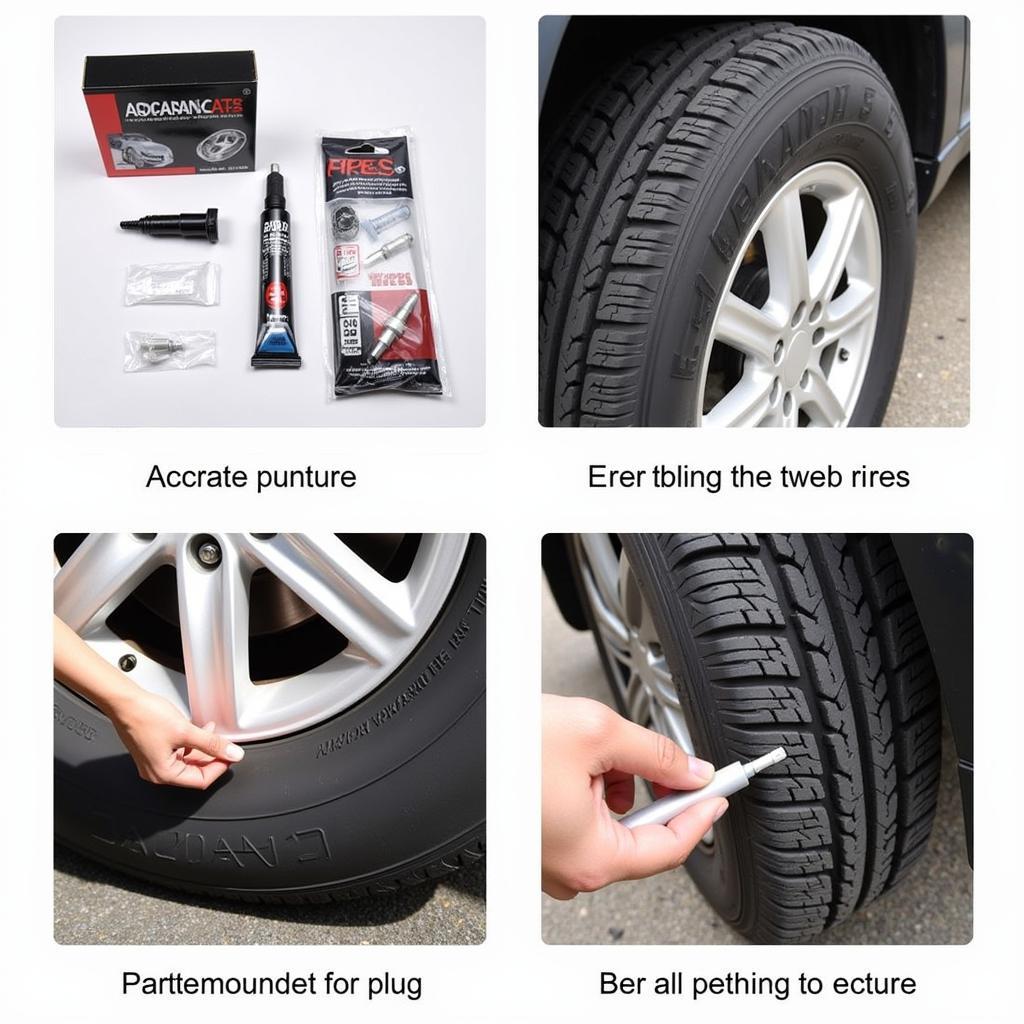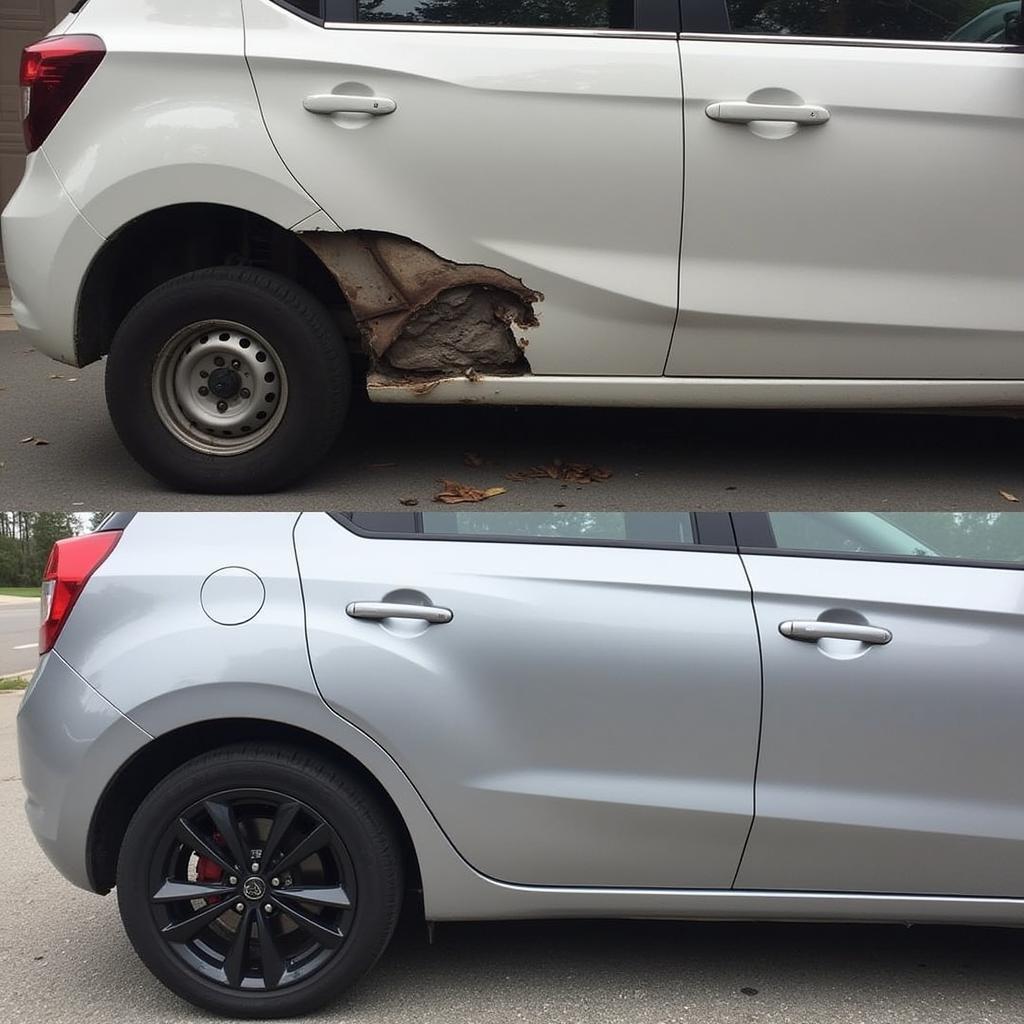One of the most frustrating car issues is a leak that you can’t seem to locate. You know air is escaping, but you can’t find the source. A “Car Fix Leaking Air” problem can manifest in several ways, from a slow tire puncture to a problem with your car’s air suspension system. This article will guide you through the most common causes of leaking air in your car and provide practical solutions to fix them.
Common Culprits Behind “Car Fix Leaking Air” Issues
Before you start digging into your toolbox, it’s crucial to pinpoint the source of the leak accurately. Here are some frequent offenders:
1. Tires: The Usual Suspects
Tires are the most common culprits of air leaks in cars. A puncture from a sharp object, a valve stem issue, or even a damaged wheel rim can lead to a slow leak that leaves you with a flat tire.
How to Check:
- Visual inspection: Carefully examine your tires for any visible signs of damage, such as nails, screws, cuts, or bulges.
- Sound check: Inflate your tires to the recommended pressure and listen closely for any hissing sounds, which could indicate a leak.
- The soapy water test: Mix a solution of soap and water and spray it onto the tire surface, including the valve stem. Bubbles forming in a particular area indicate the location of the leak.
2. Air Conditioning System: Not Just Cool Air, But Leaky Air Too?
While your car’s AC system is designed to keep you cool, it can also be a source of air leaks. Over time, seals and hoses within the system can deteriorate, leading to refrigerant leaks.
Signs of an AC Leak:
- A noticeable decrease in cooling performance
- Hissing sounds coming from the AC vents
- An unusual odor when running the AC
- Oily residue near the AC components
Finding an AC Leak:
Locating an AC leak requires specialized equipment and knowledge. It’s best to consult a qualified mechanic who can use a leak detection kit and repair the system accordingly.
how to fix leaking air conditioner in car
3. Air Suspension System: A Smoother Ride, But Prone to Leaks
If your car is equipped with an air suspension system, air leaks can lead to a rough ride and uneven vehicle height.
Signs of Air Suspension Leaks:
- The car sags, especially overnight
- The compressor runs constantly
- You hear hissing sounds near the suspension components
Identifying and Addressing Air Suspension Leaks:
Inspecting the air springs, lines, and compressor for signs of damage or wear is essential. Replacing faulty components or seeking professional help is recommended for a permanent fix.
cost to fix air shocks lincoln town car
DIY Fixes for Leaking Air in Your Car
For minor leaks, like small punctures in your tires, temporary solutions can be helpful until you can reach a repair shop.
- Tire Sealants: Tire sealant products injected through the valve stem can effectively seal small punctures.
- Portable Air Compressors: Keeping a portable air compressor in your car allows you to re-inflate your tires and temporarily address slow leaks.
 Using a tire repair kit to fix a puncture.
Using a tire repair kit to fix a puncture.
Expert Insight: “While DIY fixes can be handy in emergencies, it’s important to remember they are temporary solutions. Always have your car inspected by a qualified mechanic as soon as possible to ensure your safety on the road,” advises John Miller, Senior Automotive Technician at Miller’s Auto Repair.
When to Seek Professional Help for “Car Fix Leaking Air”
While some air leak issues can be addressed with simple DIY solutions, others require the expertise of a professional mechanic. If you encounter any of the following, it’s best to seek professional help:
- You’re uncomfortable with DIY car repairs.
- The leak persists even after attempting DIY fixes.
- You suspect a complex issue, such as an AC or air suspension leak.
how much does it cost to fix car ac leak
Conclusion
Don’t let a “car fix leaking air” problem deflate your driving experience. By understanding the common causes and knowing how to address them, you can keep your car running smoothly and safely. Remember, regular maintenance and timely repairs are key to a well-maintained vehicle. If you’re experiencing car problems and need advice, reach out to our expert team at Autotippro. We’re here to help!
Contact AutoTipPro:
Phone: +1 (641) 206-8880
Office: 500 N St Mary’s St, San Antonio, TX 78205, United States
FAQs
Q: How often should I check my tire pressure?
A: It’s recommended to check your tire pressure at least once a month and before long trips.
Q: Can I drive with a slow tire leak?
A: It’s not advisable to drive with a slow leak as it can lead to a sudden flat tire and compromise your safety.
Q: How long does an AC recharge last?
A: An AC recharge can last anywhere from a few months to several years, depending on the severity of the leak and the overall condition of the system.
[how much to fix ac leak car](https://autotippro.com/how much to fix ac leak car/)
Q: What is the average lifespan of an air suspension system?
A: The lifespan of an air suspension system can vary depending on usage and maintenance, but they typically last between 6 to 10 years.
Q: How can I prevent future air leaks in my car?
A: Regularly inspecting your tires, maintaining your AC system, and promptly addressing any signs of leaks can help prevent future issues.





Leave a Reply